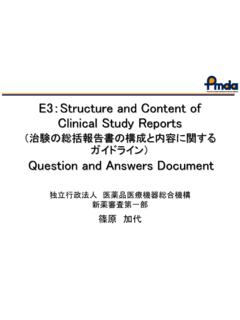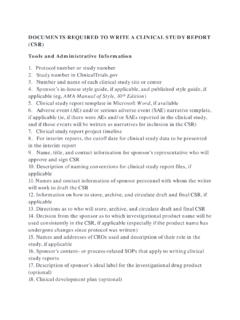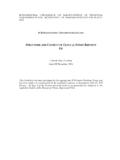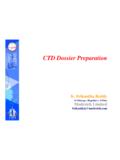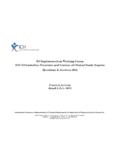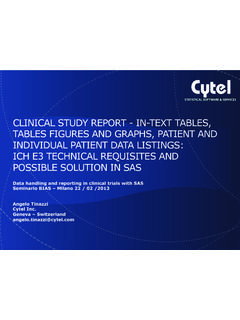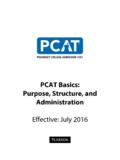Transcription of ICH Topic E 6 (R1) Guideline for Good Clinical …
1 ICH Topic E 6 (R1) Guideline for good Clinical Practice 1. GLOSSARY Adverse Drug Reaction (ADR) In the pre-approval Clinical experience with a new medicinal product or its new usages, particularly as the therapeutic dose(s) may not be established: all noxious and unintended responses to a medicinal product related to any dose should be considered adverse drug reactions. The phrase responses to a medicinal product means that a causal relationship between a medicinal product and an adverse event is at least a reasonable possibility, the relationship cannot be ruled out. Regarding marketed medicinal products: a response to a drug which is noxious and unintended and which occurs at doses normally used in man for prophylaxis, diagnosis, or therapy of diseases or for modification of physiological function (see the ICH Guideline for Clinical Safety Data Management: Definitions and Standards for Expedited Reporting).
2 Adverse Event (AE) Any untoward medical occurrence in a patient or Clinical investigation subject administered a pharmaceutical product and which does not necessarily have a causal relationship with this treatment. An adverse event (AE) can therefore be any unfavourable and unintended sign (including an abnormal laboratory finding), symptom, or disease temporally associated with the use of a medicinal (investigational) product, whether or not related to the medicinal (investigational) product (see the ICH Guideline for Clinical Safety Data Management: Definitions and Standards for Expedited Reporting). Amendment (to the protocol) See Protocol Amendment. Applicable Regulatory Requirement(s) Any law(s) and regulation(s) addressing the conduct of Clinical trials of investigational products. Approval (in relation to Institutional Review Boards) The affirmative decision of the IRB that the Clinical trial has been reviewed and may be conducted at the institution site within the constraints set forth by the IRB, the institution, good Clinical Practice (GCP), and the applicable regulatory requirements.
3 Audit A systematic and independent examination of trial related activities and documents to determine whether the evaluated trial related activities were conducted, and the data were recorded, analyzed and accurately reported according to the protocol, sponsor's standard operating procedures (SOPs), good Clinical Practice (GCP), and the applicable regulatory requirement(s). Audit Certificate A declaration of confirmation by the auditor that an audit has taken place. Audit Report A written evaluation by the sponsor's auditor of the results of the audit. Audit Trail Documentation that allows reconstruction of the course of events. Blinding/Masking A procedure in which one or more parties to the trial are kept unaware of the treatment assignment(s). Single-blinding usually refers to the subject(s) being unaware, and double-blinding usually refers to the subject(s), investigator(s), monitor, and, in some cases, data analyst(s) being unaware of the treatment assignment(s).
4 Case Report Form (CRF) A printed, optical, or electronic document designed to record all of the protocol required information to be reported to the sponsor on each trial subject. Clinical Trial/Study Any investigation in human subjects intended to discover or verify the Clinical , pharmacological and/or other pharmacodynamic effects of an investigational product(s), and/or to identify any adverse reactions to an investigational product(s), and/or to study absorption, distribution, metabolism, and excretion of an investigational product(s) with the object of ascertaining its safety and/or efficacy. The terms Clinical trial and Clinical study are synonymous. Clinical Trial/Study Report A written description of a trial/study of any therapeutic, prophylactic, or diagnostic agent conducted in human subjects, in which the Clinical and statistical description, presentations, and analyses are fully integrated into a single report (see the ICH Guideline for Structure and Content of Clinical Study Reports).
5 Comparator (Product) An investigational or marketed product ( , active control), or placebo, used as a reference in a Clinical trial. Compliance (in relation to trials) Adherence to all the trial-related requirements, good Clinical Practice (GCP) requirements, and the applicable regulatory requirements. Confidentiality Prevention of disclosure, to other than authorized individuals, of a sponsor's proprietary information or of a subject's identity. Contract A written, dated, and signed agreement between two or more involved parties that sets out any arrangements on delegation and distribution of tasks and obligations and, if appropriate, on financial matters. The protocol may serve as the basis of a contract. Coordinating Committee A committee that a sponsor may organize to coordinate the conduct of a multicentre trial.
6 Coordinating Investigator An investigator assigned the responsibility for the coordination of investigators at different centres participating in a multicentre trial. Contract Research Organization (CRO) A person or an organization (commercial, academic, or other) contracted by the sponsor to perform one or more of a sponsor's trial-related duties and functions. Direct Access Permission to examine, analyze, verify, and reproduce any records and reports that are important to evaluation of a Clinical trial. Any party ( , domestic and foreign regulatory authorities, sponsor's monitors and auditors) with direct access should take all reasonable precautions within the constraints of the applicable regulatory requirement(s) to maintain the confidentiality of subjects' identities and sponsor s proprietary information.
7 Documentation All records, in any form (including, but not limited to, written, electronic, magnetic, and optical records, and scans, x-rays, and electrocardiograms) that describe or record the methods, conduct, and/or results of a trial, the factors affecting a trial, and the actions taken. Essential Documents Documents which individually and collectively permit evaluation of the conduct of a study and the quality of the data produced (see 8. Essential Documents for the Conduct of a Clinical Trial). good Clinical Practice (GCP) A standard for the design, conduct, performance, monitoring, auditing, recording, analyses, and reporting of Clinical trials that provides assurance that the data and reported results are credible and accurate, and that the rights, integrity, and confidentiality of trial subjects are protected.
8 Independent Data-Monitoring Committee (IDMC) (Data and Safety Monitoring Board, Monitoring Committee, Data Monitoring Committee) An independent data-monitoring committee that may be established by the sponsor to assess at intervals the progress of a Clinical trial, the safety data, and the critical efficacy endpoints, and to recommend to the sponsor whether to continue, modify, or stop a trial. Impartial Witness A person, who is independent of the trial, who cannot be unfairly influenced by people involved with the trial, who attends the informed consent process if the subject or the subject s legally acceptable representative cannot read, and who reads the informed consent form and any other written information supplied to the subject. Independent Ethics Committee (IEC) An independent body (a review board or a committee, institutional, regional, national, or supranational), constituted of medical professionals and non-medical members, whose responsibility it is to ensure the protection of the rights, safety and well-being of human subjects involved in a trial and to provide public assurance of that protection, by, among other things, reviewing and approving / providing favourable opinion on, the trial protocol, the suitability of the investigator(s), facilities, and the methods and material to be used in obtaining and documenting informed consent of the trial subjects.
9 The legal status, composition, function, operations and regulatory requirements pertaining to Independent Ethics Committees may differ among countries, but should allow the Independent Ethics Committee to act in agreement with GCP as described in this Guideline . Informed Consent A process by which a subject voluntarily confirms his or her willingness to participate in a particular trial, after having been informed of all aspects of the trial that are relevant to the subject's decision to participate. Informed consent is documented by means of a written, signed and dated informed consent form. Inspection The act by a regulatory authority(ies) of conducting an official review of documents, facilities, records, and any other resources that are deemed by the authority(ies) to be related to the Clinical trial and that may be located at the site of the trial, at the sponsor's and/or contract research organization s (CRO s) facilities, or at other establishments deemed appropriate by the regulatory authority(ies).
10 Institution (medical) Any public or private entity or agency or medical or dental facility where Clinical trials are conducted. Institutional Review Board (IRB) An independent body constituted of medical, scientific, and non-scientific members, whose responsibility is to ensure the protection of the rights, safety and well-being of human subjects involved in a trial by, among other things, reviewing, approving, and providing continuing review of trial protocol and amendments and of the methods and material to be used in obtaining and documenting informed consent of the trial subjects. Interim Clinical Trial/Study Report A report of intermediate results and their evaluation based on analyses performed during the course of a trial. Investigational Product A pharmaceutical form of an active ingredient or placebo being tested or used as a reference in a Clinical trial, including a product with a marketing authorization when used or assembled (formulated or packaged) in a way different from the approved form, or when used for an unapproved indication, or when used to gain further information about an approved use.
